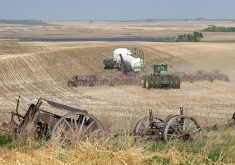Provincial governments risk diluting the benefit of a proposed new national agricultural disaster support program by refusing to fund it, said federal agriculture minister Chuck Strahl.
He said one of his priorities for the new year is to convince the provinces to buy into a stand-alone disaster program that they agreed to in principle at a November federal-provincial ministers’ meeting.
“It’s there to be used for farmers in a quick response manner,” Strahl said. “The problem is if the provinces don’t engage further, it ends up being a federal-only thing and I can do that, but the decision making on what is a disaster and what should be done about it becomes a made-in-Ottawa solution when I really want it to be a federal-provincial effort.”
Read Also

Senft to step down as CEO of Seeds Canada
Barry Senft, the founding CEO of the five-year-old Seeds Canada organization is stepping down as of January 2026.
He said the money Ottawa has approved for a disaster program assumes cost sharing, so if he has to begin unilateral federal funding, it will require more time-consuming discussion.
After the meeting, several provincial agriculture ministers said that while they agree disaster programming should be separated from the Canadian Agricultural Income Stabilization program, they also believe disasters are Ottawa’s responsibility. There is provincial reluctance to agree to a 40 percent contribution to costs that are unpredictable and open ended.
The federal minister said “fleshing out” the promised disaster program is one of his priorities but added that the agricultural agenda will be full.
Strahl plans to introduce legislation to revamp the mandate and governance structure of the Canadian Grain Commission.
The House of Commons agriculture committee report also includes recommendations that a new Canada Grains Act have a clear obligation to “protect the interests of grain producers” and guarantee farmer access to producer cars.
The agenda includes organizing a plebiscite on whether the Canadian Wheat Board should retain its monopoly over export and malting barley sales and launching consultations on agriculture policy framework programs.
















